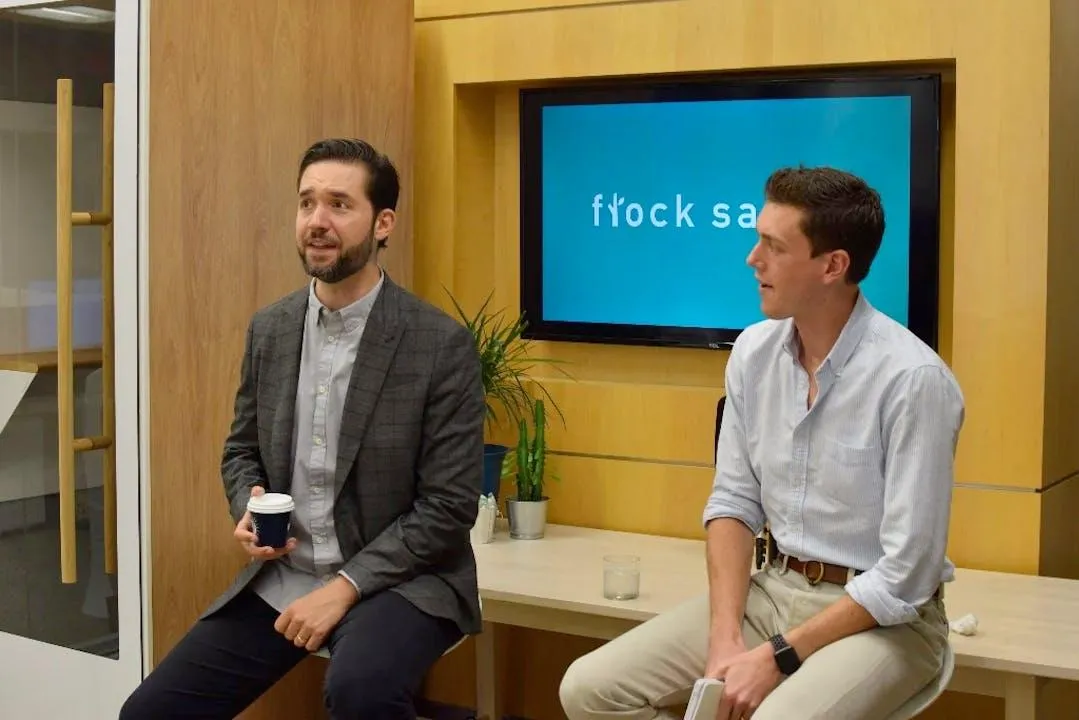


Reddit Co-Founder and Venture Investor Alexis Ohanian Talks Values, Perspectives and Tech Industry
Alexis Ohanian and his Initialized partner Garry Tan were Flock Safety’s very first investors. In June, Alexis stopped by Flock Safety’s headquarters in Atlanta to chat with CEO and co-founder Garrett Langley and the team.
About Alexis Ohanian
Alexis is the co-founder of Reddit, Initialized Capital, and a bestselling author based in Florida.
In his career, Alexis has advised and invested in over 200 tech startups and was a partner at Y Combinator. He created & hosted a show called Small Empires about tech startups and their communities; and in 2013 wrote a national bestselling book, Without Their Permission.
Along the way, Alexis spoke at TED, volunteered in Armenia as a Kiva Fellow, and was named on Forbes 30 Under 30 list two years in a row.
He also proudly designed the mascots for every company he’s started. He and his wife are the new and thrilled parents of an awesome daughter, who will be learning to program as soon as she masters solid foods.
Questions and Answers (Q&A)
Garrett: Thank you for joining us today, Alexis.
Alexis: It’s great to be here. My soon-to-be brother-in-law is a police officer, and I have a Flock camera outside my home. So I was showing screenshots to him about the product, and I was really excited about what it could do.
I sent him screenshots of the search portal, saying “Look at this!” I had the search on vehicle color and it was able to pull up every white car that had passed by my camera over the past few days. It’s instant search results.
On portraying credibility to other markets as a startup investor
Alexis: When I help push a company into other markets, being an investor helps with building the company’s credibility. But the thing I always remind founders is that they are doing the real work. Because if we obviously believe enough to be one of the first investors and we start opening the doors, it’s based on what has been built. We don’t take this lightly.
On what Alexis and Garry look for when choosing companies to invest in
Garrett: You mentioned that for a lot of companies, you start out ready to invest, but not necessarily ready to rep the company. What are some things you look for to be one of the first investors?
Alexis: When Garry Tan and I started Initialized, we wanted to start the kind of early-stage investment company that we didn’t have when we started our own companies.
When I started Reddit, there was very little to go off. We barely had a prototype when pitching a different business to Y Combinator, and they rejected us. The next morning, they called us back and said, “We really like you two. We hate the idea, but we like you two. So we want to change the idea to something that is a better market to go after. Is there a product you can build right now? We’ll invest.”
This interaction has had a big impact on my life. This idea of betting on a founder above all is still the common thread for Garry and I. We need to believe that the founding team is capable of building what they say they will, and if they’re compelling enough to hire their first 10 employees.
That doesn’t mean charismatic, necessarily. We have plenty of CEOs who are not at all charismatic or extroverted, but they have a very compelling nature about them.
Garrett: One thing that Y Combinator pushes is the relationship between co-founders. Matt Feury (Flock Safety co-founder) and I have worked together for years and we know the ins and outs of our personalities. Why Garry for you?
Alexis: Where we align is where I really push founders to make sure they are aligned—on their values. Specifically, complementary values and how founders work together. We know who we are now and we know who we’ll be as Initialized grows.
We’re thinking about the legacy we are leaving on the world through these investments that our children are going to take over. At the end of the day, there is a values alignment between us.
On early Reddit years, stepping away, and coming back to lead the team
Alexis: I was lucky because I got a second chance. We started Reddit in ‘05, sold it in ‘06, then I left in 2010. Then I came back to lead the turnaround in 2014. So I got two chances at Reddit. The biggest advantage I got after being away, doing other things, and getting out of San Francisco, was the perspective I got when I came back. It helped me make decisions quickly and clearly.
Working on the board, we were able to quickly take control of an incident around privacy and change the way the company was reacting to it. We were able to send a message that we value the privacy of women over the right to information of an open space of ideas. This decision was just obvious to us. But being away for a while helped with my perspective and being able to make an obvious decision so quickly with the team.
On how he balances his time between companies he invests in
Alexis: I have software that helps me organize my notes on each company. This includes metrics we use to measure success for these companies. We have seven partners, and each partner is a point person for a certain number of companies.
We take stock of how the company is doing, where they need help and how they’re tracking on certain metrics we’ve set.
With our software, I know every week how many investors I’ve talked to, how many founders and reporters I’ve talked to and the companies they work for. I want to know, on Sunday night when I’m prepping myself for the week, how I’ve spent my time last week and if I need to check in on Flock, for example.
I let software help not just me, but other partners of our firm see how to better spend our time. I deeply believe software like this is the future of work because jobs that are not automated and still require empathy still need to be done by humans. But we can extract the non-creative, repetitive parts of that job using software. So, figuring out how I’ve spent my time that week using my calendar and my software helps me.
On how he perceives the attitude toward women has changed in the tech industry
Alexis: We’ve gotten to meet the most impressive female founders who’ve just started their company in the past couple years. So many awesome women have started a company to fix the state of things themselves.
I can’t stress enough how important it is, especially here in Atlanta, to build this into the tech community you want it to be. Every tech community has success bringing women into it.
What did we learn from Alexis?






Protect What Matters Most.
Discover how communities across the country are using Flock to reduce crime and build safer neighborhoods.

.webp)








